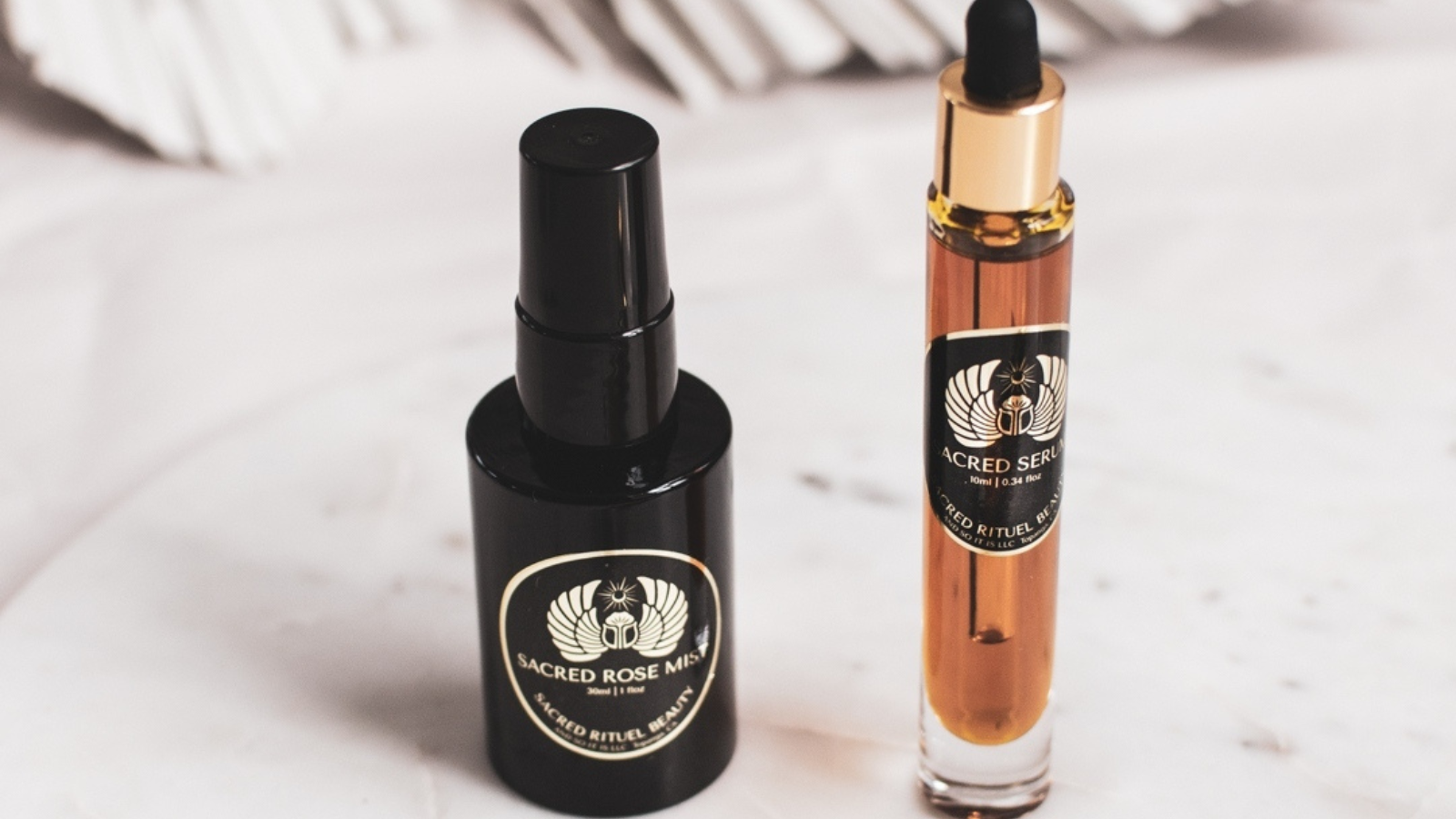
Brighten Up: Natural Skincare Tips For A Glowing Face
Key Takeaways:
- Natural Remedies: Coconut oil, oatmeal baths, and aloe vera are effective natural treatments that soothe eczema symptoms and enhance skin health.
- Diet and Hydration: A diet rich in anti-inflammatory foods and adequate hydration can significantly influence the severity and frequency of eczema flare-ups.
- Skincare Routine: Developing a consistent, gentle skincare routine tailored to eczema-prone skin is crucial for maintaining skin health and reducing symptoms.
At Sacred Rituel, we lead the charge in creating clean, organic, and sustainably sourced skincare solutions. Our commitment to excellence, combined with an in-depth knowledge of dermatological health, allows us to provide products and insights that consistently deliver purity and performance.
This piece will explore natural, practical remedies for managing eczema, a common skin condition that can affect achieving a clear and radiant complexion. We’ll explain how to integrate these remedies into your skincare routine to significantly enhance your skin’s health. Additionally, we’ll discuss dietary and lifestyle habits that promote skin health and introduce methods for managing stress to improve your skin's natural glow.
For a truly transformative experience, consider incorporating our SACRED SERUM into your regimen. Its meticulously formulated blend of organic oils is designed to soothe, hydrate, and restore your skin, leaving it luminous and healthy.
Understanding Eczema And Its Impact On Skin Health
What Is Eczema?
Eczema, or atopic dermatitis, manifests as an array of chronic, itchy skin conditions that produce dry, red, and inflamed patches. These symptoms often appear in cycles, with periods of flare-ups followed by times of relative calm. Affecting both children and adults, eczema is not contagious but can be a persistent source of discomfort. Understanding the symptoms and recognizing flare-ups early can significantly aid in managing the condition effectively.
Causes And Triggers Of Eczema
Eczema flares when the skin's protective barrier is compromised, often due to genetic factors that affect the skin's ability to retain moisture and protect against allergens, irritants, and infections. Common triggers include exposure to harsh chemicals in cleaning and personal care products, coarse materials like wool, and environmental factors such as pollen or pet dander. Identifying and avoiding personal triggers is a crucial step in minimizing eczema episodes.
The Impact Of Eczema On Skin Health And Wellbeing
Eczema can profoundly affect a person's life, causing physical discomfort and emotional distress. The visibility of eczema symptoms can lead to self-consciousness and social withdrawal, especially in severe cases. Additionally, the constant itchiness can disrupt sleep and daily activities, further impacting mental health. Managing eczema effectively is therefore essential not only for the health of the skin but also for enhancing overall quality of life.
Choosing The Right Skincare Products
Selecting suitable skincare products is critical for those with eczema. Products should be free from irritants such as fragrances, dyes, and harsh chemicals, and should aim to support the skin’s moisture barrier. Ingredients like ceramides, glycerin, and hyaluronic acid are beneficial in moisturizers for eczema-prone skin because they help maintain hydration and repair the skin's barrier. It's also advisable to test new products on a small skin area before full application to ensure they do not trigger a flare-up.

Top Natural Remedies For Managing Eczema
- Moisturizing with Coconut Oil - Coconut oil is celebrated for its moisturizing and antibacterial properties, making it a popular choice for eczema care. It helps to fortify the skin's barrier function, preventing moisture loss and protecting against irritants. Applying virgin coconut oil directly to the affected areas can provide relief from itching and reduce the dryness characteristic of eczema patches.
- The Healing Power of Oatmeal Baths - An oatmeal bath is a traditional remedy that can soothe the itchiness and irritation of eczema. Colloidal oatmeal, which is finely ground, forms a protective barrier on the skin when mixed with water. This barrier helps retain moisture and eases inflammation. A lukewarm bath with colloidal oatmeal can be a calming ritual that reduces symptoms and hydrates the skin.
- Honey as a Natural Antiseptic - Honey is known for its natural anti-inflammatory and antibacterial properties, making it an excellent treatment for healing eczema flare-ups. Applying a thin layer of raw honey to the affected area can help reduce inflammation and prevent infections due to scratching. Honey also helps keep the skin moist, which can aid in the healing process.
- Aloe Vera for Skin Regeneration - Aloe vera is another powerful natural remedy used to treat eczema. Its gel contains glycoproteins and polysaccharides, which soothe irritation and itching while also moisturizing the skin. Applying aloe vera gel directly from the plant or a pure store-bought version can help cool the skin and promote healing.
- Introduction to Essential Oils - Essential oils like lavender and chamomile are also beneficial for eczema due to their anti-inflammatory and soothing properties. When diluted with a carrier oil, such as almond or jojoba oil, these essential oils can be applied to the skin to help reduce flare-ups and calm irritation. However, it is crucial to perform a patch test first, as essential oils can be potent.
Integrating Eczema Remedies Into Your Skincare Routine
Choosing The Right Time For Application
Timing is crucial when applying eczema remedies to maximize their effectiveness. The best time to apply moisturizing agents like coconut oil or aloe vera gel is immediately after a bath or shower when the skin is still damp. This helps to lock in moisture and create a protective barrier against environmental irritants.
Creating A Daily Skincare Routine
Establishing a consistent daily skincare routine is vital for managing eczema. Start with a gentle, fragrance-free cleanser to avoid stripping the skin of its natural oils. Follow up with a natural remedy as a moisturizer, and if needed, specific treatments for flare-up areas. Regularly using these products can help maintain the skin’s integrity and reduce the frequency and severity of eczema symptoms.
Adjusting Remedies According To Seasonal Changes
Eczema symptoms can fluctuate with changes in weather and humidity levels. During colder months, you may need to apply thicker layers of moisturizer to combat dryness, whereas lighter applications will suffice in humid conditions. Additionally, ingredients like honey can be particularly soothing during dry, winter months, while aloe vera may be preferable in warmer, sunnier weather.
Monitoring Skin Response And Adjusting Accordingly
As with any skincare treatment, it’s important to monitor your skin’s response to natural remedies and adjust your approach as necessary. If a remedy causes irritation or doesn’t improve symptoms, it might be best to try an alternative. Keeping a skin diary can be helpful to track what works and what doesn’t, allowing for tailored skincare solutions that best suit your individual needs.
Additional Skincare Tips For A Radiant Complexion
Gentle Exfoliation
While exfoliation is beneficial for removing dead skin cells and promoting cell turnover, it's important to choose a method that doesn't irritate eczema-prone skin. Opt for chemical exfoliants like lactic acid or enzymatic peels rather than physical scrubs, which can be abrasive. Use these products sparingly—once or twice a week is sufficient to enhance skin brightness without causing irritation.
Protecting Skin From The Sun
Sun protection is crucial for skin health, particularly for those with eczema, as sunburn can exacerbate symptoms. Apply a broad-spectrum SPF of at least 30 daily, even on cloudy days. Look for mineral sunscreens containing zinc oxide or titanium dioxide, which are less likely to irritate sensitive skin compared to chemical sunscreens.
Balancing The Skin’s pH
The skin’s pH plays a significant role in maintaining its barrier function and overall health. Eczema-prone skin often has a disrupted pH balance, making it more susceptible to irritation. Using pH-balanced skincare products can help restore and maintain the skin's natural barrier, reducing susceptibility to irritants and infections.
Regular Skin Check-Ups
Finally, regular check-ups with a dermatologist can help manage eczema effectively and keep your skin in optimal condition. A professional can provide personalized advice and adjust treatments as needed, ensuring that your skincare routine remains effective and your skin stays healthy and radiant.
Diet And Lifestyle Choices That Support Skin Health
Importance Of A Skin-Friendly Diet
What you eat can have a significant impact on your skin health, particularly when dealing with conditions like eczema. A diet rich in anti-inflammatory foods can help reduce flare-ups and promote overall skin health. Include foods high in omega-3 fatty acids, such as salmon, flaxseeds, and walnuts, which are known for their anti-inflammatory properties. Additionally, fruits and vegetables rich in antioxidants, like blueberries, spinach, and carrots, can protect the skin from oxidative stress.
Hydration's Role In Skin Care
Maintaining adequate hydration is crucial for skin health. Water helps to flush toxins from the body and keeps the skin cells plump and hydrated. Aim to drink at least eight glasses of water a day, and consider incorporating hydrating foods like cucumbers, oranges, and watermelon into your diet. These steps can help maintain moisture in the skin, reducing dryness and the likelihood of eczema flare-ups.

Impact Of Gut Health On Skin
Emerging research suggests a strong connection between gut health and skin condition. A healthy gut can aid in reducing inflammation and promoting a strong immune system, which in turn benefits skin health. Incorporate probiotic-rich foods like yogurt, kefir, and sauerkraut into your diet to support gut health. Additionally, a fiber-rich diet helps support a balanced gut microbiome, further enhancing skin health.
Exercise And Stress Reduction Techniques
Regular exercise not only improves your overall health but also reduces stress, which can trigger eczema flare-ups. Activities like yoga, swimming, or even brisk walking can enhance circulation and help reduce stress. Moreover, incorporating regular stress-management techniques, such as meditation, deep breathing exercises, or mindfulness, can improve your quality of life and reduce the incidence and severity of eczema symptoms.
Sleep's Influence On Skin Health
A good night’s sleep is essential for skin health, as it allows the skin to repair and regenerate. Lack of sleep can lead to increased stress and worsening of eczema symptoms. Aim for 7-9 hours of quality sleep per night. Creating a relaxing bedtime routine and ensuring a comfortable sleep environment can significantly improve sleep quality and, consequently, skin health.
Final Thoughts
The conversation about natural skincare for eczema emphasizes that a radiant complexion is closely connected to overall holistic health. Sacred Rituel's insights underline the significance of choosing calming, natural remedies and embracing a lifestyle that encompasses a balanced diet, stress management, and a regular skincare routine. By prioritizing overall well-being, individuals with eczema can enhance their skin health and quality of life, demonstrating the power of natural ingredients and proactive care in sustaining healthy, vibrant skin.
Read also:
- Sensitive Skin Care: Choosing The Right Products
- Understanding Arnica: Nature's Solution For Skin Care
- Managing Acne-Prone Skin: Expert Advice And Solutions
Frequently Asked Questions About Natural Remedies For Eczema
What natural oils are recommended for eczema care?
Natural oils like coconut oil and jojoba oil are beneficial for eczema care due to their moisturizing and barrier-repair properties. They help to prevent moisture loss and soothe inflamed skin.
Can diet influence the severity of eczema symptoms?
Yes, diet plays a critical role in managing eczema. Anti-inflammatory foods such as omega-3 fatty acids and antioxidants can help reduce flare-ups and promote skin health.
What is the best way to apply remedies to manage eczema?
Applying eczema remedies right after bathing when the skin is still damp is most effective. This timing helps lock in moisture and creates a protective barrier.
Are there any specific exercises that benefit skin health?
Gentle exercises like yoga and swimming can improve circulation and reduce stress, which in turn can help manage eczema symptoms by minimizing flare-ups.
How can honey be used to treat eczema?
Honey, known for its anti-inflammatory and antibacterial properties, can be applied directly to the affected area to reduce inflammation and prevent infections.
What role does hydration play in skin health for eczema sufferers?
Staying hydrated is essential as it helps keep the skin moisturized from the inside, reducing dryness and irritation common in eczema.
How does gut health impact eczema?
A healthy gut can reduce inflammation and strengthen the immune system, which benefits skin health and can mitigate eczema symptoms.
What should one look for in sunscreen for sensitive, eczema-prone skin?
Look for mineral-based sunscreens with zinc oxide or titanium dioxide, as they are less likely to irritate sensitive skin compared to chemical sunscreens.
What is the importance of a skincare routine for eczema?
Establishing a consistent skincare routine using gentle, hydrating products can help maintain the skin's integrity and reduce the frequency and severity of eczema flare-ups.
Can stress management techniques improve eczema?
Yes, stress management techniques like meditation and deep breathing exercises can reduce stress levels, which may help decrease the severity and frequency of eczema flare-ups.
Sources:
- Grinich, E. E., Thibau, I. J., Latour, E., Price, K. N., Loiselle, A. R., Simpson, E., & Begolka, W. S. (2023). Factors Associated with Eczema Clinical Trial Awareness, Interest, and Participation in Adults. Acta Dermato-Venereologica, 103, adv6520–adv6520. https://doi.org/10.2340/actadv.v103.6520
- Sawangjit, R., Dilokthornsakul, P., Lloyd-Lavery, A., Lai, N. M., Dellavalle, R., & Chaiyakunapruk, N. (2020). Systemic treatments for eczema: a network meta-analysis. Cochrane Database of Systematic Reviews. https://doi.org/10.1002/14651858.cd013206.pub2
- Liu, W., Cai, J., Sun, C., Zou, Z., Zhang, J., & Huang, C. (2022). Time-trends for eczema prevalences among children and adults from 1985 to 2015 in China: a systematic review. BMC Public Health, 22(1). https://doi.org/10.1186/s12889-022-13650-7







Commentaires (0)
Il n'y a pas de commentaires pour cet article. Soyez le premier à laisser un message !